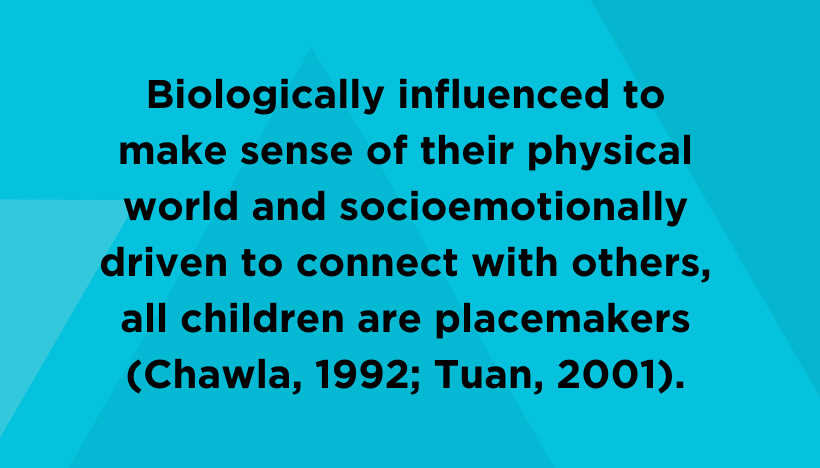This is an excerpt from “Readerly Explorations: Reimagining Reader Response Journals to Engage Readers as Placemakers” by NCTE member Sarah Fischer, which appeared in the November 2020 issue of Language Arts. Read the full article.
Using reader-text-place transactions as a framework, this article presents an approach to reader response journals that broadens definitions of “reader” and acknowledges children as placemakers.
Several years ago, after I had just completed a whole-class study of folktales in my fourth-grade classroom, Mikayla (all names are pseudonyms) stood in front of her peers on the carpet ready to share her most recent Readerly Exploration: a multimodal, reader response journal activity requiring readers to connect their reading experiences to local place(s). She held up a collage of photographs she had taken at a local park with her grandmother and explained, “I went to Bailey Park for my Readerly Exploration because my uncle told me a story that a bank robber hid money somewhere in the woods there and no one has ever found it.”
Ben interjected: “My dad said it was buried under where the pavilion is now!” Several more students attempted to offer their insider knowledge before I was able to turn their attention back to Mikayla. After sharing her experience reading Rumpelstiltskin and then exploring the park, she concluded with a smile: “It was really fun to go to the park, because it reminded me of how people a long time ago told each other stories so they wouldn’t give up hope and I hoped I would find the money.” Giggles erupted as the next student made her way up to the front of the carpet to share.
A sense of place, one’s developing affection for the distinctive qualities of a particular place (Ryden, 1993), is linked to a sense of belonging (Brillante & Mankiw, 2015).
Biologically influenced to make sense of their physical world and socioemotionally driven to connect with others, all children are placemakers (Chawla, 1992; Tuan, 2001). Because of this, Altman, Stires, and Weseen (2015) refer to schools’ disconnection from local place experiences as a “teachers’ and students’ rights issue” (p. 2) and they challenge educators to prioritize children’s connections to local place as a goal of instruction:
There is an urgency about this enterprise that is unique to our time. In a culture that is anything but mindful and present, place has never been so important. In classrooms particularly, teachers and students are distracted by the dictates of data-driven instruction, high-stakes assessment, and standardized curriculum. (pp. 1–2)
To position readers as placemakers in literacy contexts is to see them as having agency to shape the various dimensions of the places in which they dwell (Derr, Chawla, & Mintzer, 2018) and to acknowledge reading experiences as a powerful vehicle for this important work.
There are many ways young readers use texts to engage in placemaking during their recreational reading that can inform a place-conscious approach to literacy instruction. When children’s independent geographic accessibility expands in middle childhood (Sobel, 1993) at the same time that reading independence is often developing, these two identities (reader identity and place identity) intersect in dynamic ways through reading transactions.
Characterized by imaginative play and multisensory/multimodal aesthetic engagement with their physical environment, readers engage in placemaking behaviors as modes of response, including repositioning, nesting, transportation and layering (Fischer, 2017) as described [in this article.]
These authentic kinds of reader-text-place transactions serve as the framework by which I have reimagined reader response journals with my students both in my former role as a fourth-grade teacher and in my current role teaching preservice teachers.

Sarah Fischer is an assistant professor in the Department of Education at Messiah University in Mechanicsburg, Pennsylvania. She can be contacted at sfischer@messiah.edu.
Not a Language Arts subscriber? Find details here.
It is the policy of NCTE in all publications, including the Literacy & NCTE blog, to provide a forum for the open discussion of ideas concerning the content and the teaching of English and the language arts. Publicity accorded to any particular point of view does not imply endorsement by the Executive Committee, the Board of Directors, the staff, or the membership at large, except in announcements of policy, where such endorsement is clearly specified.

